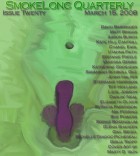Would you agree that this piece is prose poem-ish?
Yes, absolutely. It was written that way on purpose—I wanted to write something fictional about the experience of summer camp but I wanted to focus on images as a way to tell the story. For me, camp was a visceral experience every time, no matter what kind of camp it was or how old I was. It was very physical, whether you were swimming, sailing, horseback riding, or just nursing a bad sunburn. My work tends to use a lot of description and imagery, but with this story I really tried to strip it down to the images. It was interesting to focus on the story this way.
This story does what I hope most flash fiction will do—tell a simple story with great impact. What do you hope to achieve in your flash fiction, and in this story in particular?
Thanks. In my flash fiction I hope to achieve what I do with any length of work—I want to affect the reader. Not in a manipulative way at all—I try to create something that resonates on an emotional level, in a way that is genuine and true rather than sensational or false. For flash fiction in particular, I want to create a complete world in a small space so the reader knows they aren’t missing anything in the story—that it’s being told as a flash because that’s the only way it can genuinely be told.
With this story, as I mentioned above, I wanted to create something that focused on imagery as a way to move the story forward. I was also trying to create something that worked on both a universal and specific level regarding the experience of summer camp. I’ve been told this story is very “female”—but I’m hopeful that it also resonates with men. God knows lots of them also went to camp.
Eighty-two words. Impressive. How do you achieve brevity in your work?
Ruthless editing. I wish it were more complicated than that so I could seem like a creative genius, but it isn’t—I read my work over and over, looking for words to trim. It’s very workmanlike, not sexy at all.
The Rambler is one of my favorite magazines. What’s it like to work there?
Thanks very much! It’s rewarding, challenging work, and I feel lucky to be able to do it. Our staff is small, which means that I’m involved in almost every aspect of the magazine, and that makes for a lively work life. And I love working with our contributors—so it’s fair to say that I’m really enjoying it.
Congratulations on placing in the Kathy Fish Fellowship contest! Will you share a bit about your experience in applying for the fellowship? Preparing the goal statement, selecting the stories, the wait, etc.?
I’m really honored to have placed. It was a good experience—I was impressed (and grateful) that the wait was so short, and selecting the stories was fun. Probably the most difficult part was working on the statement, just because I usually feel awkward writing about my writing—I feel like I get in the way, and the work does better standing on its own. Of course, after reading this I’m hoping people don’t agree with that.



 The core workshop of SmokeLong Fitness is all in writing, so you can take part from anywhere at anytime. We are excited about creating a supportive, consistent and structured environment for flash writers to work on their craft in a community. We are thrilled and proud to say that our workshop participants have won, placed, or been listed in every major flash competition. Community works.
The core workshop of SmokeLong Fitness is all in writing, so you can take part from anywhere at anytime. We are excited about creating a supportive, consistent and structured environment for flash writers to work on their craft in a community. We are thrilled and proud to say that our workshop participants have won, placed, or been listed in every major flash competition. Community works.